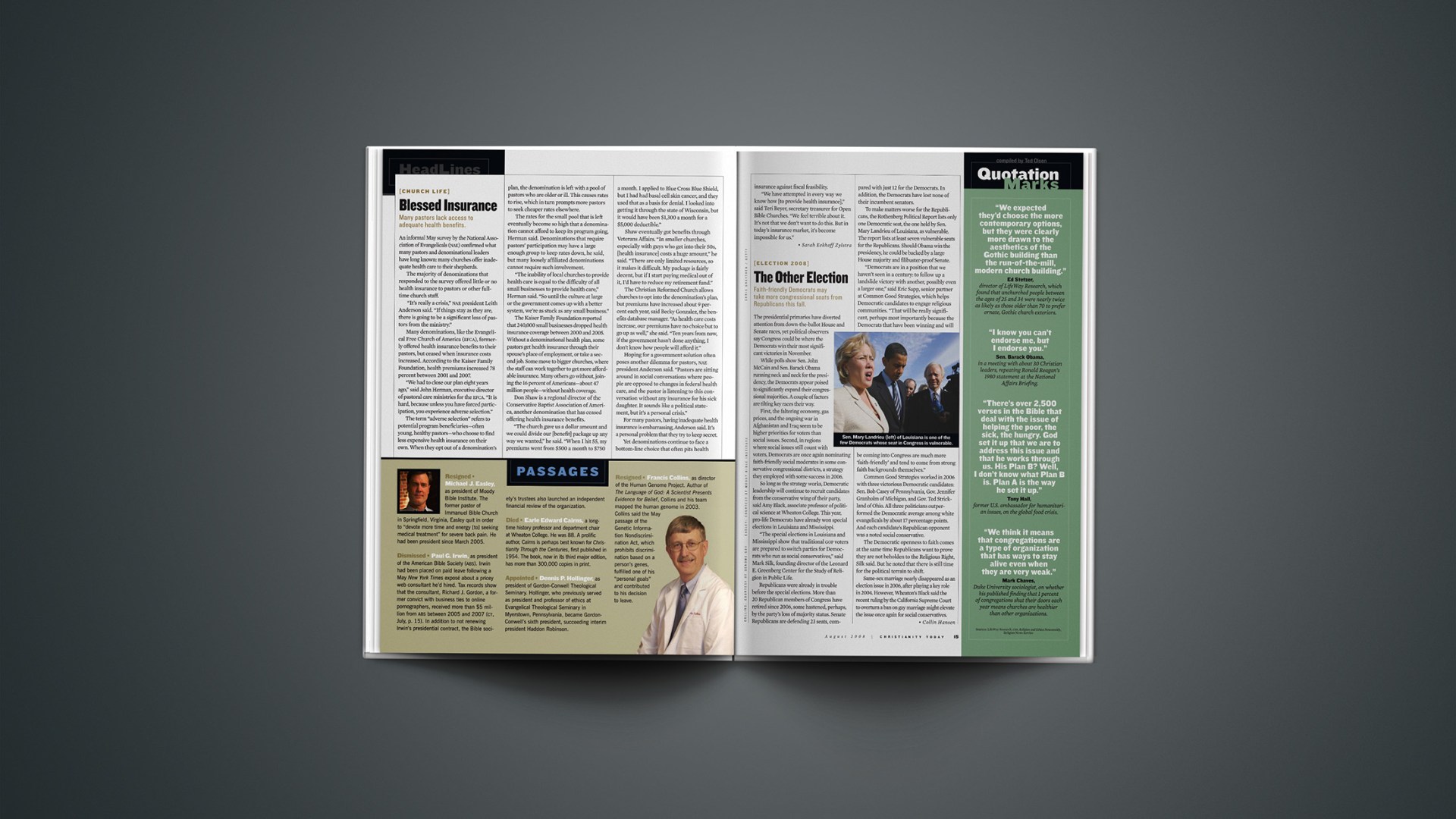An informal May survey by the National Association of Evangelicals (NAE) confirmed what many pastors and denominational leaders have long known: many churches offer inadequate health care to their shepherds.
The majority of denominations that responded to the survey offered little or no health insurance to pastors or other fulltime church staff.
“It’s really a crisis,” NAE president Leith Anderson said. “If things stay as they are, there is going to be a significant loss of pastors from the ministry.”
Many denominations, like the Evangelical Free Church of America (EFCA), formerly offered health insurance benefits to their pastors, but ceased when insurance costs increased. According to the Kaiser Family Foundation, health premiums increased 78 percent between 2001 and 2007.
“We had to close our plan eight years ago,” said John Herman, executive director of pastoral care ministries for the EFCA. “It is hard, because unless you have forced participation, you experience adverse selection.”
The term “adverse selection” refers to potential program beneficiaries — often young, healthy pastors — who choose to find less expensive health insurance on their own. When they opt out of a denomination’s plan, the denomination is left with a pool of pastors who are older or ill. This causes rates to rise, which in turn prompts more pastors to seek cheaper rates elsewhere.
The rates for the small pool that is left eventually become so high that a denomination cannot afford to keep its program going, Herman said. Denominations that require pastors’ participation may have a large enough group to keep rates down, he said, but many loosely affiliated denominations cannot require such involvement.
“The inability of local churches to provide health care is equal to the difficulty of all small businesses to provide health care,” Herman said. “So until the culture at large or the government comes up with a better system, we’re as stuck as any small business.”
The Kaiser Family Foundation reported that 240,000 small businesses dropped health insurance coverage between 2000 and 2005. Without a denominational health plan, some pastors get health insurance through their spouse’s place of employment, or take a second job. Some move to bigger churches, where the staff can work together to get more affordable insurance. Many others go without, joining the 16 percent of Americans — about 47 million people — without health coverage.
Don Shaw is a regional director of the Conservative Baptist Association of America, another denomination that has ceased offering health insurance benefits.
“The church gave us a dollar amount and we could divide our [benefit] package up any way we wanted,” he said. “When I hit 55, my premiums went from $500 a month to $750 a month. I applied to Blue Cross Blue Shield, but I had had basal cell skin cancer, and they used that as a basis for denial. I looked into getting it through the state of Wisconsin, but it would have been $1,300 a month for a $5,000 deductible.”
Shaw eventually got benefits through Veterans Affairs. “In smaller churches, especially with guys who get into their 50s, [health insurance] costs a huge amount,” he said. “There are only limited resources, so it makes it difficult. My package is fairly decent, but if I start paying medical out of it, I’d have to reduce my retirement fund.”
The Christian Reformed Church allows churches to opt into the denomination’s plan, but premiums have increased about 9 percent each year, said Becky Gonzalez, the benefits database manager. “As health care costs increase, our premiums have no choice but to go up as well,” she said. “Ten years from now, if the government hasn’t done anything, I don’t know how people will afford it.”
Hoping for a government solution often poses another dilemma for pastors, NAE president Anderson said. “Pastors are sitting around in social conversations where people are opposed to changes in federal health care, and the pastor is listening to this conversation without any insurance for his sick daughter. It sounds like a political statement, but it’s a personal crisis.”
For many pastors, having inadequate health insurance is embarrassing, Anderson said. It’s a personal problem that they try to keep secret.
Yet denominations continue to face a bottom-line choice that often pits health insurance against fiscal feasibility.
“We have attempted in every way we know how [to provide health insurance],” said Teri Beyer, secretary treasurer for Open Bible Churches. “We feel terrible about it. It’s not that we don’t want to do this. But in today’s insurance market, it’s become impossible for us.”
Related Elsewhere:
Other news stories on money and business are in our full-coverage section.










